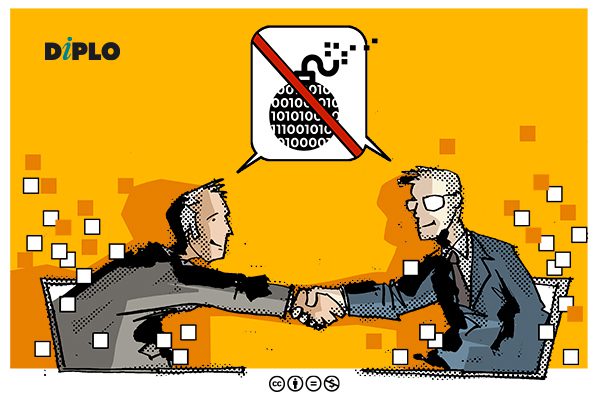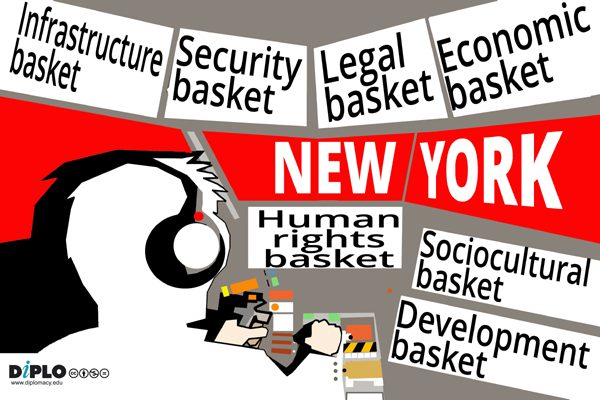Cybersecurity
Today’s headlines often feature the word ‘cyber’, reporting on threats related to the virtual world: online child abuse, stolen credit cards and virtual identities, malware and viruses, botnets and denial-of-service attacks on corporate or government servers, cyber-espionage, and cyber-attacks on critical infrastructure.
Cybersecurity came into sharper focus with the rapid expansion of the Internet’s user base. One side effect of the rapid integration of the Internet in almost all aspects of human activity is the increased vulnerability of modern society. Core services of modern society, such as communications, electric grids, transport systems, health services, and “smart cities”, are increasingly dependent on the Internet. They are frequent targets of cyber-attacks.
What are the real cybersecurity challenges? What is the role of diplomacy, international legal instruments, and regional and national policies in addressing these threats, and how efficient are they? How does international cooperation in cybersecurity work, and what are the roles of the various stakeholders?
Diplo focuses on these and other related questions through online and in situ courses, awareness-raising sessions and events, evidence-based analysis, policy research, illustrations, videos and other visuals. At the same time, the GIP Digital Watch observatory, operated by DiploFoundation, maintains regular updates on cybersecurity issues, actors, processes and mechanisms.
Featured: Comic “The secret life of a cyber vulnerability”
This new comic brings a worrying, yet realistic and educative story that follows a life of a digital vulnerability, from its inception to its deployment for an actual cyberattack. Vulnerabilities are one of the main components of cyber-weapons, used equally for warfare, crime, terrorist or other attacks. Instead of being mitigated, they are often traded, stockpiled and used for attacks. In essence, the comic book discusses responsibility of various stakeholders – governments, private sector, end users – for global cyber(in)security. Read more in our research and publications section.
Holistic approach to cybersecurity
Current situation and challenges
Cybersecurity has come to the forefront of the international diplomatic and political agenda in United Nations committees, the North Atlantic Treaty Organization (NATO), the International Telecommunication Union (ITU), the Council of Europe (CoE), the Organisation for Economic Co-operation and Development (OECD), the Organization for Security and Co-operation in Europe (OSCE), the Commonwealth, the Group of Eight (G8), and the Group of Twenty (G20), to name just a few of the most important fora. In the meantime, attention to the possibility of cyber-war swings from hype to lack of attention, due to wide ignorance.
Cybercrime, which is often part of our real life experience, is dealt with through a number of international processes, as the judicial and law enforcement authorities cooperate across borders. Many countries have adopted national cybersecurity strategies and related legislation. A growing number of countries have set up national mechanisms for response to cyber-incidents (mainly in form of CERT or CSIRT), involving government as well as the corporate, academic, and NGO sectors. Some have declared ‘cyber’ as the fifth military domain, and have set up defensive and offensive cyber-commands within their armies.
Nevertheless, the risks are increasingly sophisticated, while the groups interested in exploiting cyberspace vulnerabilities have extended from underground communities of ‘black-hat’ hackers to global and well-organised criminal and terrorist groups, government security services, and defence forces. To make things more complicated, most of the Internet infrastructure and services are privately owned, with operators scattered around different global jurisdictions.
Multidisciplinary and multistakeholder response
A meaningful systematic response to cybersecurity risks depends on a deep understanding of the multidisciplinary aspects of cyberspace: the nexus of technology, law, psychology, sociology, economy, political science, and diplomacy. Cybersecurity framework includes policy principles, instruments, and institutions dealing with cybersecurity. Thematically, it is an umbrella concept covering:
- Network security (including technical measures, organisational policies, standards and incident response)
- Cybercrime (including emerging challenges and frameworks to combating cybercrime)
- Internet safety (including user safety challenges and particularly child online protection)
- Critical infrastructure and resources (including security of the critical infrastructure, and critical Internet resources)
- Cyber-conflicts and cyber-norms (including challenges, application of international law to cyberspace, and main processes)
- Terrorist use of the Internet (including tools, targets and frameworks for combating terrorism)
Setting up national and international cybersecurity policies and mechanisms, however, requires looking at a broader context, primarily the links of security with economic development (including innovations, e-commerce and intellectual property rights), human rights (including privacy, online freedoms and trust), and Internet governance in general.
The efficiency of the response further depends on partnerships among stakeholders that can contribute to reducing the risks:
- government and regulatory authorities with their ability to create a legal, regulatory, and policy environment for cybersecurity;
- judicial institutions and law enforcement authorities with their competences and responsibility for criminal prosecution and cross-border cooperation mechanisms;
- the private sector and technical communities with their expertise and de-facto control over the majority of infrastructure, services, and standards;
- non-governmental organisations and academia with their knowledge, networks, and capacity to reach out to end-users and alert them about the misuse of cyberspace.
Capacity building
Comprehensive approach to capacity building
DiploFoundation plans, prepares and implements capacity building programmes in cybersecurity policy. The sustainability of capacity building requires moving beyond using the term as a political buzzword and employing disconnected sets of simple training sessions, short workshops, or events, to include building institutional, organisational, system, and networking capacities to deal with cybersecurity and the digital environment.
Our capacity building approach addresses both hard and soft capacities – from specialised knowledge and know-how to operational and adaptive capacities. It combines professional and academic online courses and in-situ training, coaching and support, policy immersion and research, webinars and remote participation at events, as well as community facilitation. In these activities, Diplo involves number of experts and lecturers from its own Faculty, as well as from its Partners. Diplo’s online community gathers over 1600 alumni and associates from all over the world.
Capacity building portfolio
Online activities
Highly interactive online course bringing a group of 15-25 professionals together, with facilitation of certified online tutors and contributions from renown experts in field, as well as short webinars:
- Annual professional online course in cybersecurity
- Annual academic online course in cybersecurity (as a single course or within the post-graduate programme in contemporary diplomacy), accredited by the University of Malta
- Customised online courses in cybersecurity in cooperation and with support of partner institutions (such as for South-Eastern Europe)
- Dedicated thematic webinars (such as for diplomats, on cyber-norms or on policy trends in building cybersecurity competences)
In-situ activities
Customised in-situ activities involving thematic lectures and discussions, skills building, process simulations, and technical show-cases:
- Training for youth professionals (such as for Western Balkans)
- Training for diplomats (such as Asia Cyber Diplomacy Workshop “Diplomacy: Between Tradition and Innovation”, or course on “Internet Governance” for Geneva permanent missions)
- Awareness-raising and training events for diplomats (dedicated cybersecurity days such as “Fighting Cybercrime through closer International Cooperation” and “Cybersecurity: a Strategic View“; Scenario simulation exercise organised during the OSCE Chairmanship Event on Effective Strategies to Cyber/ICT Security Threat; a luncheon event “Towards a secure cyberspace via regional cooperation” organised on the occasion of the second meeting of the 2016-2017 UN GGE)
- Practical exercises in form of CyberLab, with simulations of cyber-attacks, visits to Dark Web, trying the BitCoin market and exploring the potentials and risks of 3D printing and Intenet of Things (such as that organised during the 22nd OSCE Ministerial Council and Vienna Cyber Diplomacy Day)
Research and mapping work
Policy research and mapping developments, processes, actors and instruments:
- Mapping cybersecurity trends and developments, processes, actors and instruments, reports and sources within Digital Watch of the Geneva Internet Platform pages (general pages on cybersecurity, as well as dedicated pages such as for the UN GGE process)
- Policy research work upon demand (see below)
- Visualisation of key cybersecurity challenges for awareness-raising and educational purposes (see below)
Awareness raising
Illustrations and animated videos

Diplo has prepared number of illustrations depicting cybersecurity challenges. Browse the gallery and pick any that can help you explain cybersecurity better.
How does DNSSec work? What is Deep Packet Inspection? Why do we need IPv6? What should we know about cloud computing? Watch the short animated movies of Diplo’s Internet Governance Lite series.
Watch the short videos on introduction to cybersecurity, cybercrime and spam from our Internet governance series
Send a postcard from cyberspace!

Pick your favorite poscard, add your personal message – and share via Twitter, Facebook or Instagram, or print and give out to friends and colleagues!
You can find all the postcards available for sharing or download here.
Comic book on child safety online

Click to show page navigation!













